|
|
|
Sort Order |
|
|
|
Items / Page
|
|
|
|
|
|
|
| Srl | Item |
| 1 |
ID:
119954
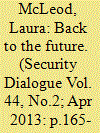

|
|
|
|
|
| Publication |
2013.
|
| Summary/Abstract |
Contemporary debates about security narratives highlight different forms of security: gender security, realist security or human security. The use of such terms often means that we do not recognize subtle variances within these narratives or the implications of these divergences. This article suggests and illustrates a way of achieving a deeper understanding of security narratives through investigating the temporal aspects of narrative content. A case study exploring three forms of gender security narratives among activists of feminist and women's organizations in Serbia is used to demonstrate that similar perceptions of gender security exist. However, paying attention to the temporal discontinuities within the contents of these gender security narratives makes it possible to identify divergences connected to personal-political imaginations of conflict and post-conflict. These subtle variations in content are potentially product and productive of different policy prescriptions and outcomes. This article concludes by reflecting upon the presence of our past and future in the contents of our contemporary security narratives, suggesting that when we consider security, our analysis should aim to incorporate an understanding of the temporal nature of a security narrative.
|
|
|
|
|
|
|
|
|
|
|
|
|
|
|
|
| 2 |
ID:
139990


|
|
|
|
|
| Summary/Abstract |
The main goal of this study is to look at factors determining mediation success in post-conflict environments. More specifically, the authors focus on the level of involvement of the mediator in a post-conflict setting and argue that relational mediation strategies should fare better in such environments. A most similar systems comparison of the European Union/USA and Turkish mediation efforts in Bosnia–Herzegovina, both of which started in October 2009, renders support for the authors’ argument. Their analysis of these two cases suggests that Turkey's relational mediation strategy delivered concrete outcomes in post-Dayton Bosnia compared to the structural intervention style adopted by the European Union/USA. The authors conclude that a relational mediation strategy facilitates the achievement of constructive solutions by helping third parties to make broader assessments of the conflict situation, and by offering flexible options in issue selection and process design.
|
|
|
|
|
|
|
|
|
|
|
|
|
|
|
|
| 3 |
ID:
190758


|
|
|
|
|
| Summary/Abstract |
To what extent are legislators, responsible for the implementation of many peace agreements, responsive to citizens’ preferences? Examining the 2016 Colombian peace agreement, we embed an experiment in the 2019 wave of a survey of all the members of Congress. We inform legislators about the attitudes of the general population and residents of conflict-affected regions on a provision included in the peace agreement: the creation of 16 special seats in the House of Representatives reserved for conflict areas. We find that legislators underestimate citizen support for this policy, and the magnitude of their misconception is correlated with the positions of their parties on the issue. Moreover, we find that providing information about citizens’ support for the policy does not affect legislator support for the provision.
|
|
|
|
|
|
|
|
|
|
|
|
|
|
|
|
| 4 |
ID:
120083
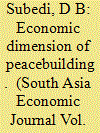

|
|
|
|
|
| Publication |
2012.
|
| Summary/Abstract |
This article studies economic dimension of peacebuilding, concentrating on post-conflict economic recovery and development (PCERD) in Nepal. The current peace process in Nepal has a historical opportunity to address economic root causes of the armed conflict and lay a foundation for inclusive economic development. However, the economic dimension of peacebuilding has been sidelined by the contentious transitional politics in the Nepali peace process. Taking a maximalist approach to development, this article argues that PCERD in Nepal should be understood as a multiple-faceted long-term process which might incorporate both short-term and long-term priorities. While the short-term priority should target at delivering the economic dividends of peace in the immediate aftermath of the conflict, the long-term priority should be geared towards addressing the economic root causes of the preceding armed conflict as well as laying the foundation for an inclusive economic development. It should be accomplished by taking into account a wider range of the social, economic, political, psychosocial, and security related needs and aspirations of the conflict-affected people as well as the wider populace. Making an analysis from a political economy perspective, this article also discusses potential barriers to PCERD and finds that lack of commitment by the key political actors to engage in policy debates and discussions around economic recovery and development and dwindling post-conflict public security are the barriers to economic recovery and development in post-conflict Nepal.
|
|
|
|
|
|
|
|
|
|
|
|
|
|
|
|
| 5 |
ID:
120118
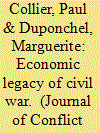

|
|
|
|
|
| Publication |
2013.
|
| Summary/Abstract |
This article positions itself among the very rare microeconomic analyses on the consequences of civil war. Up to now, most analyses on this topic are based on household surveys. The originality of the present study is that it investigates for the first time the likely predominant route by which civil conflict affects the economy, specifically through firms. The context of the study is Sierra Leone, a country that was ravaged by violent conflict from 1991 to 2002. The approach is to use geographical variations in the intensity of conflict to estimate the impact of violence on firms, on which we have data from the World Bank 2007 Employers' Survey. The proposed theory is that during conflict, violence affects production through a form of technical regress and demand through a reduction in income. The persistent post-conflict effects are less obvious. We assume that war forces a prolonged contraction in output skills, which slows the pace of recovery. We termed this phenomenon "forgetting by not doing". The results confirm our theory: the size of firms in 2006 is negatively affected by the intensity of the war in the area it operates. The analysis of training needs clearly corroborates the long-lasting lack of skills experienced as a result of the war in areas where the conflict was more intense. Yet, the analysis cannot identify robust recovery patterns.
|
|
|
|
|
|
|
|
|
|
|
|
|
|
|
|
| 6 |
ID:
114685
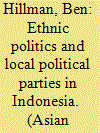

|
|
|
|
|
| Publication |
2012.
|
| Summary/Abstract |
Since Indonesia's return to multiparty democracy in 1999, national law makers have introduced regulations that effectively ban ethnic or regionally based political parties. A major exception to the rule can be found in the province of Aceh where ethnic separatists were granted the right to form their own political party to contest local elections in return for giving up their armed struggle for independence. In legislative elections held in 2009 the party of the former rebels - the Aceh Party - won a landslide victory. Drawing on in-depth interviews with national party leaders and parliamentarians, this article examines the implications of the rise of the Aceh Party for Indonesia's political party system and the potential for ethnic-based parties to resolve ethnic conflict and secessionism in other parts of Indonesia, including in Papua where the failure of special autonomy arrangements has led to increased militancy among indigenous Papuans.
|
|
|
|
|
|
|
|
|
|
|
|
|
|
|
|
| 7 |
ID:
103975


|
|
|
|
|
| Publication |
2011.
|
| Summary/Abstract |
The real question is not whether Kabila will win reelection, but how he has survived for 10 years in the presidency.
|
|
|
|
|
|
|
|
|
|
|
|
|
|
|
|
| 8 |
ID:
137953


|
|
|
|
|
| Summary/Abstract |
How do groups mobilise around non-ethnic issues in deeply divided societies and cities? This article seeks to answer this question by offering a close reading of one particular exemplary episode in the recent history of post-conflict Bosnia & Herzegovina: the 2008 Sarajevo protests. Sarajevans took to the streets to demand more security in the wake of the murder of a young boy on a tram. The article analyses the framings used by the mobilising social movements in depth, exploring in detail the connections with the local cultural environment, as well as the demobilising authorities’ counter-frames.
|
|
|
|
|
|
|
|
|
|
|
|
|
|
|
|
| 9 |
ID:
107900
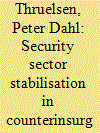

|
|
|
|
|
| Publication |
2011.
|
| Summary/Abstract |
This article argues that the debate on security sector reform (SSR) needs to be taken further by taking into consideration the fact that, even though the SSR concept was not originally developed as an element in stabilising states undergoing an insurgency, it is very much being used for exactly that. When conducting counterinsurgency with a focus on the creation of stability, the baseline will ultimately have to be security sector stabilisation (SSS) as a precondition for complete SSR implementation. However, the two must be connected to avoid them undermining each other. This is important if a comprehensive approach to programme implementation and especially sustainability is to guide the programme, and not just isolated 'train and equip' stand-alone projects that do not solve either the initial need for stabilisation or the long-term need for accountable security forces. Currently, in Afghanistan the surge for security by the international military is in danger of overtaking the other elements of the SSR, thereby undermining the primary end state and thus risking laying the wrong foundation for the long-term process of SSR.
|
|
|
|
|
|
|
|
|
|
|
|
|
|
|
|
| 10 |
ID:
094702


|
|
|
|
|
| Publication |
2010.
|
| Summary/Abstract |
How should researchers treat questions of veracity when conducting interviews in settings rent by large-scale violence, such as war and genocide? To what extent should researchers trust narratives that are generated in politically sensitive contexts? The article argues that the value of narrative data does not lie solely in their truthfulness or accuracy; it also lies in the meta-data that accompany these testimonies. Meta-data are informants' spoken and unspoken thoughts and feelings which they do not always articulate in their stories or interview responses, but which emerge in other ways. This article identifies and analyzes five types of meta-data: rumors, inventions, denials, evasions, and silences. The article argues that meta-data are not extraneous to our datasets, they are data and should be viewed as integral to the processes of data collection and analysis. Meta-data indicate how conditions in the present shape what people are willing to say about violence in the past, what they have reason to embellish or minimize, and what they prefer to keep to themselves. Attending to meta-data is important for responding to informants' fears about talking to a researcher and to ensure informants' safety after the researcher leaves the field. It is also crucial for the robustness of researchers' theories and knowledge about political violence and other political phenomena. The article draws from the author's nine months of fieldwork in Rwanda in 2004, as well as the literature on conflict and violence from political science, anthropology, history, and sociology.
|
|
|
|
|
|
|
|
|
|
|
|
|
|
|
|
| 11 |
ID:
186064


|
|
|
|
|
| Summary/Abstract |
Disarmament, demobilization, and reintegration (DDR) processes will often dismantle the command-and-control structures of non-state armed groups (NSAGs) to prevent possible remobilization. Recent studies demonstrate that in some cases ex-combatant networks provide important social and economic support that hasten transitions to civilian life; however, this literature focuses exclusively on networks that emerge among commanders, peers, and foot soldiers. In this article, we broaden existing literature on ex-combatant networks by examining the role that family relations play in combatants’ war and post-war trajectory. Drawing on 18 life history interviews with former male combatants from the Lord’s Resistance Army (LRA) we argue that the familial can often be as influential as peer-relations. Specifically, our study shows that, first, familiies can shape the defection, demobilization, and reintegration processes of ex-combatants, and, second, ex-combatant networks can play an important role in facilitating the reunion of families in the aftermath of war. The endurance of familial relations forged within NSAGs pose important considerations to DDR policies.
|
|
|
|
|
|
|
|
|
|
|
|
|
|
|
|
| 12 |
ID:
097671
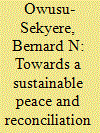

|
|
|
|
|
| Publication |
2009.
|
| Summary/Abstract |
The article begins with a profile of the Ivorian civil war which remains at management
stage pending the result of a successful democratic election to seal the various agreements
signed between the government and the rebel parties. Taking examples from West Africa,
a case is presented for constituting and pursuing a reconciliatory process that deals with
the hurts and harms arising from human right abuse and extra-judicial killings by both
the state army and rebel forces. Reconciliation processes in Latin America and sub-
Saharan Africa are examined and a truth and reconciliation commission is proposed for
Côte d'Ivoire.
|
|
|
|
|
|
|
|
|
|
|
|
|
|
|
|
| 13 |
ID:
172163
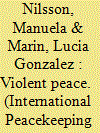

|
|
|
|
|
| Summary/Abstract |
Countries that sign a peace agreement to emerge from protracted violent conflict often begin reconstructing their societies amidst continued high levels of violence. Responding to this situation, national security policies often identify core threats primarily from a state perspective, disregarding local community perceptions of threat and insecurity. This paper is based on interviews conducted in Colombia with members of three rural communities that have undergone and still suffer from different forms of post-accord violence. Differentiating between measurable and lived security threats, it identifies the communities’ perceptions of threats to their current security situation and compares them to those of the state security actors stationed in the communities. Embedded in the call for more pragmatic, bottom-up peacebuilding, we argue that security is context-specific and stress the importance of understanding the diversity of local community perspectives on security for building sustainable peace under conditions of ongoing violence. Final policy recommendations thus underline the need for a more differentiated approach towards improving security levels that meets the specific threat perceptions and security concerns of local communities and improves cooperation between the communities and state security actors to bring sustainable, localized peace to context-specific security environments.
|
|
|
|
|
|
|
|
|
|
|
|
|
|
|
|
| 14 |
ID:
178683


|
|
|
|
|
| Summary/Abstract |
Why do former belligerents institutionalize power-sharing arrangements after a civil war ends? The choice of power-sharing institutions shapes the nature of governance in many post-conflict settings. A better understanding of how belligerents come to choose institutionalized forms of power-sharing would thus help us explain how belligerents come to make a seemingly simple institutional choice that may have immense consequences. Existing scholarship emphasizes the nature of the conflict preceding negotiations, international actors, or state institutional capacity as critical factors for determining whether former belligerents will agree to share power or not. Yet these accounts overlook the importance of political considerations between and within ethnic groups. This article argues that elites create power-sharing institutions when the most significant threat to their political power comes from an outside group as opposed to from within their own group. That is, forward-looking and power-minded leaders of former belligerents push for the type of power-sharing at the negotiating table that affords them the greatest opportunity to influence country-level politics after the conflict has concluded in full. For elites facing competition from outside, this means securing power-sharing through institutional rules and guidelines in the settlement of the civil war to ensure that they are included in the governance of the state. By contrast, for elites fearing in-group rivals, complex governance institutions are at best unnecessary and, at worst, a significant concession to weaker opponents. I test the argument with a cross-national analysis of an original dataset of 186 power-sharing negotiations from 1945–2011. The empirical analysis suggests that elites are most likely to institutionalize power-sharing when no single ethnic group dominates politics and when most ethnic groups are unified. The quantitative analysis is complemented with illustrative examples from cases of power-sharing negotiations that offer insight into the proposed theoretical mechanisms.
|
|
|
|
|
|
|
|
|
|
|
|
|
|
|
|
|
|
|
|
|